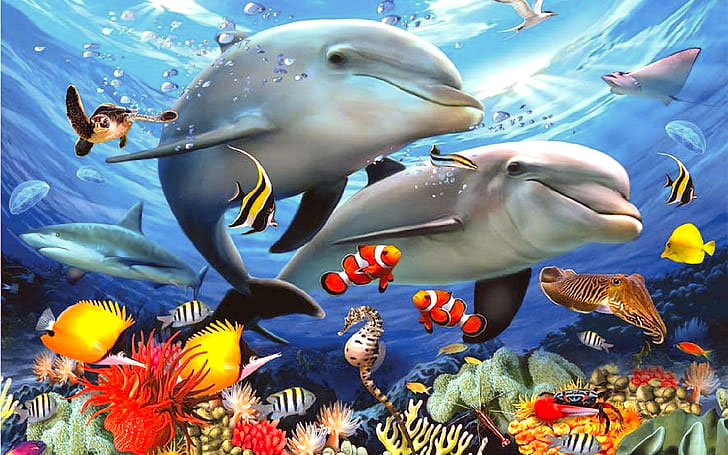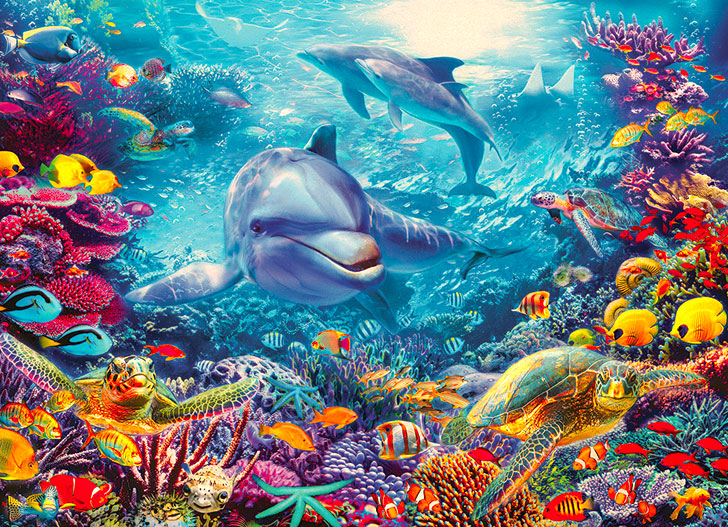Communicating With Dolphins
 by Robert Charroux
by Robert Charroux
The Mystery of Dolphins
Dolphins are, and always have been, popular all over the world. They have figured in legends, and people say that in the old days they spoke a human language.
Until quite recently this was, of course, taken to be just another fairy tale.
Privileges like those extended to apes were also conceded to dolphins by the ancients; which is to say that they occupied much the same place among men in those days as horses and dogs do among us. Dolphins were believed to be the most intelligent animals in creation, and a mysterious, sacred relationship existed between them and human beings.
Among early Christians they symbolized the peregrinations of the soul. It has been suggested that they owed this honor to their ability to jump high towards the heavens; but this does not seem very convincing, and the real reason is lost among traditions that have not come down to us.
If captured, it was said, a dolphin would burst into tears, but it was never known to attack man, seeming to have respect and liking for the human race. It enjoys following ships on the high seas which sharks also do, though in their case it is done for the sake of eating any fish there may be around and anything that is jettisoned by the crew.
If this may be thought to apply also to dolphins, there is no doubt that something of sentiment, of play and of affection, comes into it. Actually, they do not usually follow ships, but precede or escort them, just like dogs going out for a walk, with no discernible material interest in the matter.
When they see dolphins, Mediterranean sailors still carry on the hereditary custom of whistling tunes to please them. Legend tells numbers of stories of dolphins who have shown themselves to be good friends to man.
The Greek poet and musician Arion, who leapt into the sea to escape assassination, was saved by them.
Pliny tells a delightful story of a boy who was great friends with one of them, and who used to ride to school on its back.
Of course these are legends, but there still might be a basis of truth.
 Dolphins Talk With Men
Dolphins Talk With Men
Between a man who plays at being a fish and a creature who aspires to live with man, bonds of affection and confidence are sometimes established even in our day, to provide a link with the distant past.
On various occasions these kindly creatures have saved deep sea divers in distress by bringing an extra oxygen capsule or by guiding them to the surface in a difficult spot.
Tuffy, a pet dolphin at the Point Mugu Naval Centre in California, works in the closest collaboration with American divers. Delicate missions are entrusted to him, and Tuffy carries them out unfailingly, to the admiration of all.
To seal the pact between men and dolphins only one thing is wanting to solve the language problem; Professors Bateau and Bastian are convinced that this will in fact be settled in the very near future.
Professor Lilly has succeeded in teaching quite a little vocabulary to his pet dolphin Elvar, and says that the cetacean understands and speaks some twenty words of English.
Two dolphins, one of them in a pool at Seattle, Washington State, and the other at Vancouver, British Columbia, had a chat on the telephone lasting nearly half an hour. In their own language, of course!
On 17th October 1967, the Soviet newspaper Selskaya Jizu (Rural Life) reported that a trawler sailing off the Crimea was surrounded by dolphins who showed quite unmistakably by the way they were swimming and whistling that they wanted him to go towards a particular buoy. When the spot was reached, the fishermen saw that the sea all round the buoy was abnormally disturbed. They lifted a floating net, and discovered that a baby dolphin had got itself tangled up in it. When the little creature had been freed, its friends and relations uttered sounds that seemed to be exclamations of joy, and then they followed the trawler up to the coast, as if to say thank you.
Being extremely affectionate, a dolphin is said to pine to death if its consort disappears, but at a ‘wedding’ it shows its satisfaction in just the same way as a human being. Christos Mavrothalassitis, a diver, claims to have been present at a dolphin wedding in the Mediterranean. The couple swam between two lines of dolphins who were, so he says, ‘yelling their heads off’ to show how pleased they were.
This most delightful and friendly creature has one hereditary enemy, the shark, which it does not hesitate to attack and which it always overpowers. A shark is a good swimmer, but its speed is far inferior to that of the enemy; moreover it has to roll onto its back to use its jaws, which are underneath the muzzle.
Dolphins know this and, confident in their tactical superiority, they attack in Indian file, hurling themselves at the shark’s belly with terrific speed, and end by disemboweling it.
 When Dolphins Tell The History Of Man
When Dolphins Tell The History Of Man
Never has a dolphin been known to attack a human being. On the contrary, it is as friendly as any faithful animal friend, so much so that one feels strongly inclined to believe that there really was a mysterious alliance between them in a far-off Golden Age, when all earthly creatures were united in brotherly love.
This is what the initiate Gregori B … also believes. He dates man’s first appearance on earth in the second tertiary period, at the same time as tapirs, parrots, Barbary ducks and dolphins.
Humanity of the great past had no ambition to govern the earth; it lived in harmony with all creatures, but made particular friends with some of them, among whom was the dolphin, perhaps the most intelligent of all.
Nothing particularly noteworthy has therefore happened in their own history and, since they never mix with other animals, one is entitled to hope that they have in the ample convolutions of their brains preserved, as though in a magnetic memory, the remembrance of important events that happened some hundreds of thousands of years ago. In that case their memories would have reference to cataclysms, floods and the story of the relations between men and dolphins.
In the same way, serious study is being carried on into the possibility, if not of dialogues with parrots, at least of discovering in their language some words which might have been, part of a universal language in ancient times.
 Parrots can imitate the human voice perfectly, and if in olden days they lived in contact with men, some words or phrases are likely to have been stored up which, through the action of their chromosomes, might from time to time crop up in their soliloquys.
Parrots can imitate the human voice perfectly, and if in olden days they lived in contact with men, some words or phrases are likely to have been stored up which, through the action of their chromosomes, might from time to time crop up in their soliloquys.
For example, if a particular parrot nowadays often sang ‘God Save the Queen’ or ‘Pop Goes The Weasel’, its descendants would inherit a tendency to find these songs easy to sing, and after a few generations this would turn into a hereditary characteristic.
Animal brains, like human brains, have an immense number of cells, not, perhaps, disposing them to broadcast anything, but possibly registering something. To bring these memories into the light of day would be an almost insoluble problem if men had not the great good fortune to be able to try the experiment with our super-intelligent friends, who also have the gift of words the dolphins.
Excerpt from The Mysterious Unknown
Posted in Other Topicswith comments disabled.





